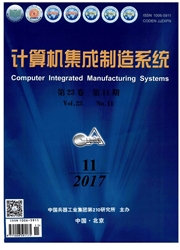

 中文摘要:
中文摘要:
With a comprehensive consideration of multiple product types,past-sequence-dependent(p-s-d) setup times,and deterioration effects constraints in processes of wafer fabrication systems,a novel scheduling model of multiple orders per job(MOJ)on identical parallel machines was developed and an immune genetic algorithm(IGA) was applied to solving the scheduling problem.A scheduling problem domain was described.A non-linear mathematical programming model was also set up with an objective function of minimizing total weighted earliness-tardiness penalties of the system.On the basis of the mathematical model,IGA was put forward.Based on the genetic algorithm(GA),the proposed algorithm(IGA) can generate feasible solutions and ensure the diversity of antibodies.In the process of immunization programming,to guarantee the algorithm’s convergence performance,the modified rule of apparent tardiness cost with setups(ATCS) was presented.Finally,simulation experiments were designed,and the results indicated that the algorithm had good adaptability when the values of the constraints’ characteristic parameters were changed and it verified the validity of the algorithm.
 英文摘要:
英文摘要:
With a comprehensive consideration of multiple product types, past-sequence-dependent ( p-s-d ) setup times, and deterioration effects constraints in processes of wafer fabrication systems, a novel scheduling model of multiple orders per job(MOJ) on identical parallel machines was developed and an immune genetic algorithm(IGA) was applied to solving the scheduling problem. A scheduling problem domain was described. A non-linear mathematical programming model was also set up with an objective function of minimizing total weighted earliness-tardlness penalties of the system. On the basis of the mathematical model, IGA was put forward. Based on the genetic algorithm (GA), the proposed algorithm (IGA) can generate feasible solutions and ensure the diversity of antibodies. In the process of immunization programming, to guarantee the algorithm's convergence performance, the modified rule of apparent tardiness cost with setups (ATCS) was presented. Finally, simulation experiments were designed, and the results indicated that the algorithm had good adaptability when the values of the constraints' characteristic parameters were changed and it verified the validity of the algorithm.
 同期刊论文项目
同期刊论文项目
 同项目期刊论文
同项目期刊论文
 A multiple-criteria real-time scheduling approach for multiple-load carriers subject to LIFO loading
A multiple-criteria real-time scheduling approach for multiple-load carriers subject to LIFO loading Try and error-based scheduling algorithm for cluster tools of wafer fabrications with residency time
Try and error-based scheduling algorithm for cluster tools of wafer fabrications with residency time Modelling and scheduling analysis of multi-cluster tools with residency constraints based on time co
Modelling and scheduling analysis of multi-cluster tools with residency constraints based on time co Heuristic tabu search scheduling algorithm for wet-etching systems in semiconductor wafer fabricatio
Heuristic tabu search scheduling algorithm for wet-etching systems in semiconductor wafer fabricatio Scheduling method for single-arm cluster tools of wafer fabrications with residency and continuous r
Scheduling method for single-arm cluster tools of wafer fabrications with residency and continuous r An efficient analytical method for performance evaluation of transfer lines with unreliable machines
An efficient analytical method for performance evaluation of transfer lines with unreliable machines 期刊信息
期刊信息
